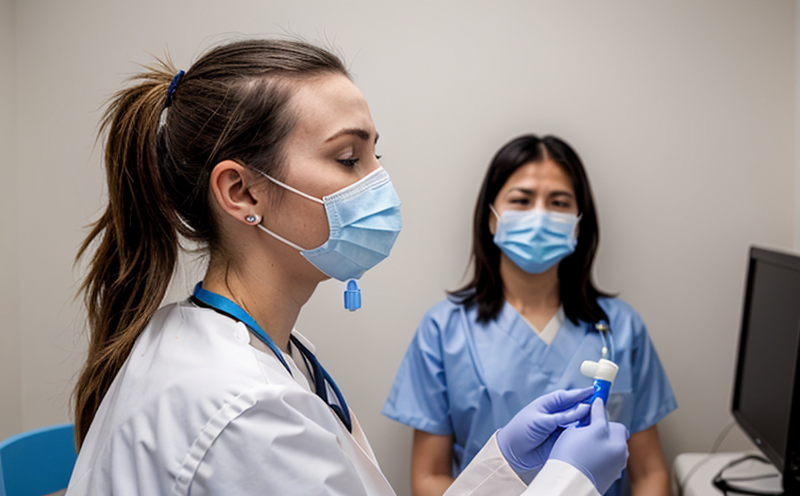Respiratory Disease Surveillance Testing in Zoos
Respiratory disease surveillance testing plays a critical role in maintaining the health and well-being of zoo animals. With increasing awareness of zoonotic diseases and the need for proactive management, respiratory disease surveillance is essential to ensure that these animals remain healthy and contribute positively to their habitats.
Zoos are not only responsible for the physical care but also the overall health of their residents. Respiratory issues can be particularly challenging as they often require early detection and intervention to prevent the spread within the herd or zoo population. By implementing regular respiratory disease surveillance testing, zoos can identify potential threats before they escalate into full-blown infections.
The testing process involves collecting samples from various animals using non-invasive methods such as nasal swabs or breath analysis. These samples are then analyzed using advanced laboratory techniques to detect the presence of pathogens like bacteria, viruses, and fungi that cause respiratory diseases. The results provide a comprehensive overview of the zoo's respiratory health status.
Regular testing ensures compliance with international standards for animal welfare and helps in maintaining accreditation from organizations such as the World Organization for Animal Health (OIE) or the Association of Zoos and Aquariums (AZA). It also supports the development of effective treatment plans if any infections are detected, thereby minimizing the risk to both animals and visitors.
At Eurolab, our expertise in respiratory disease surveillance testing is unmatched. We employ state-of-the-art equipment and follow rigorous protocols to ensure accurate results every time. Our team of specialists works closely with zoo personnel to understand their unique needs and challenges, providing tailored solutions that meet the highest standards of care.
In summary, respiratory disease surveillance testing is crucial for maintaining a healthy environment in zoos, ensuring compliance with international regulations, and supporting animal welfare efforts. With Eurolab's comprehensive services, you can rest assured that your zoo's respiratory health is being monitored effectively and efficiently.
Scope and Methodology
The scope of our respiratory disease surveillance testing in zoos includes the identification and monitoring of various pathogens responsible for respiratory diseases. This involves collecting samples from different species using non-invasive methods, such as nasal swabs or breath analysis. The collected specimens are then analyzed under controlled laboratory conditions to detect the presence of bacteria, viruses, and fungi.
| Sample Collection | Pathogens Detected |
|---|---|
| Nasal Swabs | Bacteria (e.g., Pseudomonas aeruginosa, S. maltophilia) |
| Breath Analysis | Viruses (e.g., Rhinovirus, Coronavirus) |
| Fungal Cultures | Fungi (e.g., Candida albicans, Microsporum gypseum) |
The methodology follows strict guidelines to ensure accuracy and reliability. We use internationally recognized standards such as ISO 15148:2013 for the collection of respiratory samples, which ensures that the specimens are collected in a way that minimizes contamination and maximizes integrity.
For breath analysis, we employ advanced technology like mass spectrometry to identify volatile organic compounds indicative of respiratory diseases. This approach provides rapid results while maintaining high levels of precision.
The entire process adheres to strict quality control measures, ensuring consistency in sample handling and analysis. Compliance with international standards such as ISO 15248:2013 further reinforces our commitment to delivering accurate and reliable test outcomes.
Eurolab Advantages
At Eurolab, we pride ourselves on offering a suite of services that go beyond just respiratory disease surveillance testing. Our comprehensive approach ensures that your zoo's health monitoring is thorough and effective:
- Expertise in Pathogen Identification: Leveraging our extensive experience, we can accurately identify even the most elusive pathogens.
- Rigorous Compliance: Ensuring all tests meet stringent international standards to maintain accreditation from reputable organizations.
- Patient-Centric Solutions: Tailored testing plans that address specific zoo needs and challenges.
- Advanced Technology: Utilizing cutting-edge equipment for precise sample analysis.
- Comprehensive Reporting: Providing detailed reports with actionable insights to guide decision-making processes.
- Consultative Approach: Working closely with zoo personnel to understand their unique requirements and provide personalized support.
Our commitment to excellence is reflected in our unwavering dedication to providing reliable, accurate, and timely results. By choosing Eurolab for your respiratory disease surveillance testing needs, you are investing in the health and well-being of your zoo animals.
Use Cases and Application Examples
Respiratory disease surveillance testing is applicable across various scenarios within a zoo setting:
- Preventive Care: Regular testing helps in early detection, allowing for prompt intervention before diseases become widespread.
- Outbreak Management: In the event of an outbreak, rapid identification and monitoring enable effective containment strategies.
- New Arrival Screening: Ensuring that newly introduced animals do not bring any pathogens into the zoo environment.
- Research Support: Providing data for scientific studies on respiratory health in different species.
- Visitor Safety: Minimizing risks to visitors by ensuring a healthy animal population within the zoo.
These applications underscore the importance of regular testing in maintaining a safe and healthy environment for both animals and visitors. By incorporating these practices into your routine, you can significantly enhance the overall health and welfare of your zoo community.





